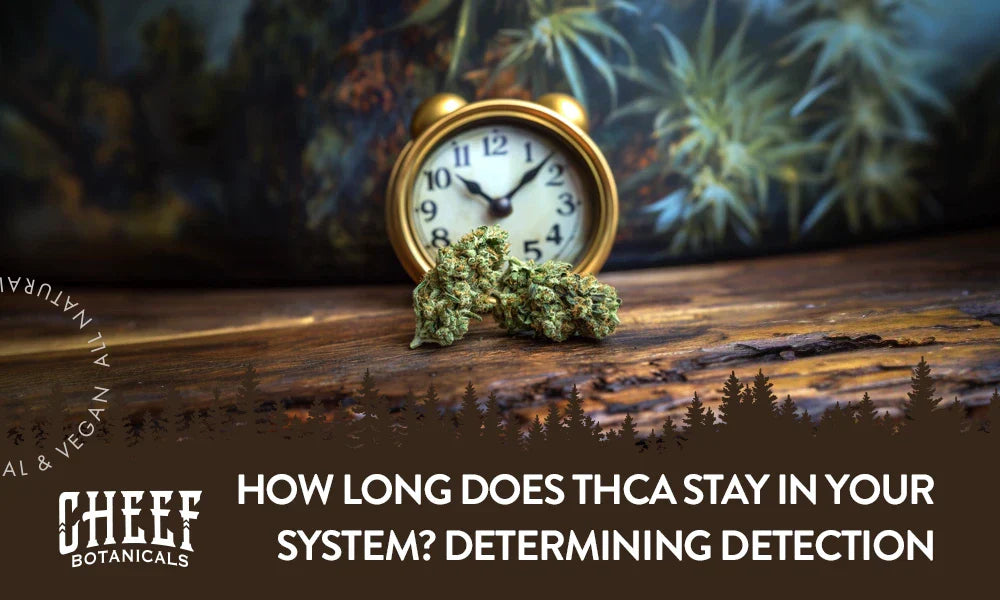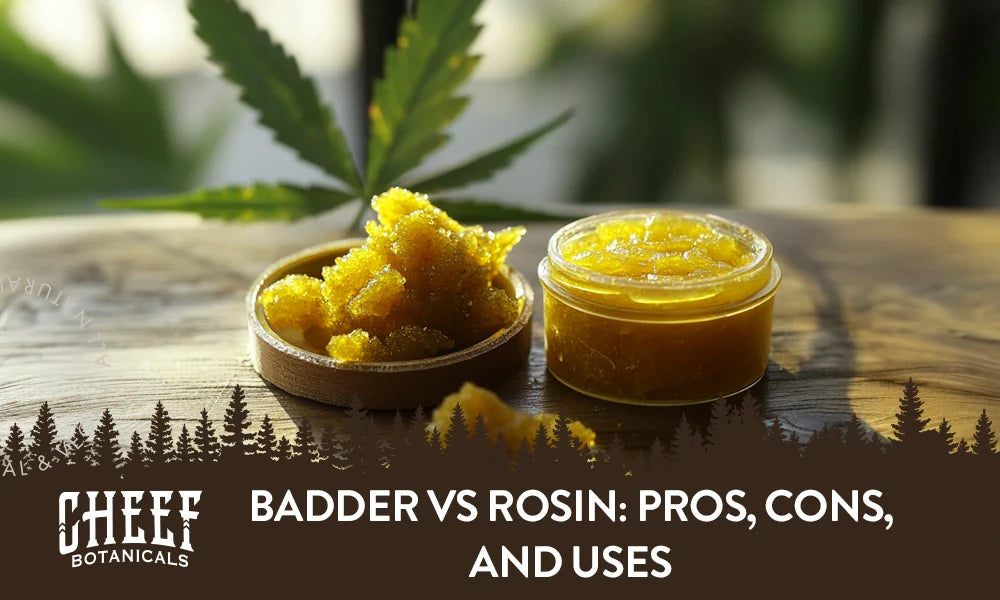How long does THCa stay in your system? It's not a one-size-fits-all answer! Factors like your body's chemistry, how often you consume THCa, and whether you're using raw or heated forms all come into play.
Raw THCa, in its natural state, has a higher likelihood of not showing up on most drug tests, but the story changes once it's heated and converted into THC. Depending on these variables, THCa might clear from your body within a week or linger for up to 45 days.
Curious about how this all works? Read on to explore the ins and outs of how cannabinoids interact with your body, including how they are metabolized and stored in body fat. Keep reading as we explore the differences between raw THCa and its heated conversion into THC, and shed light on how drug tests like urine, saliva, and hair screens detect these compounds.
What Is THCa?

THCa, short for tetrahydrocannabinolic acid, is a naturally occurring compound found in raw cannabis. Unlike THC, which is known for producing psychoactive sensations, THCa remains non-psychoactive in its raw form. This means consuming raw cannabis or herbal supplements containing THCa won't lead to altered perceptions or a "high."
However, the story changes when THCa is exposed to heat. THCa converts into THC, the psychoactive compound, through a process known as decarboxylation. This transformation plays a key role in how your body processes THCa and how long it stays in your system.
How THCa Differs From THC
THCa and THC might seem similar, but they're fundamentally different in how they interact with your body. THCa is found in raw cannabis and remains non-psychoactive, meaning it doesn't produce the elevated or euphoric effects associated with THC. In contrast, THC, or tetrahydrocannabinol, is the compound that delivers those well-known intoxicating effects.
The key difference lies in how they're processed. THCa transforms into THC when heated, whether through vaping, smoking, or cooking. This conversion changes its chemical structure, making THC detectable in drug tests while raw THCa often remains undetected.
Is THCa Psychoactive?
No, THCa isn't psychoactive when it's raw. Ingesting THCa won't cause you a high or even a buzz because it doesn't interact with the brain the same way THC does. However, if you heat THCa, it transforms into THC, which is psychoactive. This means smoking, vaping, or cooking with cannabis changes its effects. For those who prefer non-psychoactive options, sticking to raw THCa is the way to go.
How THCa Is Processed by the Body
When you consume THCa, your body handles it differently depending on whether it's raw or heated. In its raw form, THCa stays non-psychoactive, but when heated, it turns into THC. How your body processes it affects how long THCa stays in your system.
If you smoke or vape THCa it instantly turns into THC and enters your bloodstream quickly. When eaten raw (not heated previously), it stays as THCa and moves through your digestive system first. Once in the body, it can be stored in fatty tissues (if ingested raw) or broken down into THC metabolites (if heated and consumed). THC metabolites are what drug tests like urine tests and blood tests look for. For regular cannabis users, THC can stay in body fat cells longer, which may affect drug screenings.
The Role of the Endocannabinoid System
The endocannabinoid system (ECS) is like your body's cannabinoid traffic controller. It helps manage processes like mood, appetite, and how your body handles cannabinoids like THCa. This system includes receptors (CB1 and CB2) that interact with cannabis compounds, but THCa itself doesn't directly bind to these receptors in its raw form.
When THCa transforms into THC, it interacts more strongly with the CB1 receptor in your brain, creating psychoactive effects. However, in its raw state, THCa mainly supports other functions without causing a buzz. The ECS also influences how your body stores cannabinoids in fatty tissues and eliminates THC metabolites.
How THCa Converts to THC Through Decarboxylation
THCa turns into THC when it’s heated, a process known as decarboxylation. This means that when you smoke, vape, or cook raw cannabis, you're turning non-psychoactive THCa into psychoactive THC. This change is important because THC, not THCa, is what most drug tests are designed to detect.
When heated, THCa transforms into THC, it changes chemically and starts interacting with your body. THC gets broken down into metabolites, which are stored in fatty tissues or excreted through urine. Drug tests like urine and blood screenings aim to identify THC metabolites in the system. If you regularly consume THCa in heated forms, THC can stay in your system longer, leading to a positive drug screening.
Metabolization of THCa in the Liver
Once THCa enters your body, it's processed differently depending on whether it has been decarboxylated into THC. For raw THCa, the liver plays a smaller role since it's not psychoactive. However, if decarboxylated THCa becomes THC, the liver steps in to metabolize it into detectable THC metabolites.
In the liver, enzymes break down THC into compounds like 11-OH-THC and THC-COOH, which are stored in fatty tissues or eliminated through urine. These metabolites are what drug screenings look for in tests like urine drug screens and saliva tests. The liver's efficiency in metabolizing THC can vary based on several factors, like how often you consume THCa, dosage sizes, and your body's unique processes. Chronic cannabis consumers might retain stored THC metabolites longer, impacting how long they stay detectable in their system.
Factors That Influence How Long THCa Stays in Your System
How long THCa stays in your system depends on several factors. Your body chemistry, lifestyle, and how often you consume THCa all play a role. Let's explore the key factors that determine how long THCa or its metabolites remain detectable in drug tests like urine or blood tests.
Frequency of Use
How often you consume THCa has a major impact on how long it stays in your system. If you consume THCa occasionally, your body may eliminate it faster than chronic consumers who partake regularly. For frequent users, THC metabolites can build up in body fat cells, extending the detection window for drug tests. Sensitive tests, like urine drug screens, are more likely to detect stored THC in chronic users.
Dosage and Potency of THCa Products
The amount of THCa you consume and the strength of the product matter, too. Higher dosages or more potent forms, like smoking cannabis or concentrates, mean your body will take longer to eliminate THC metabolites. For example, herbal supplements with strong THCa concentrations can produce more stored THC, which might affect how long it stays detectable. Consuming THCa in smaller amounts may result in a shorter detection window.
Individual Metabolism and Body Fat Percentage
Your metabolism and body fat percentage are key factors in how your body processes THCa. People with quick metabolisms process THC metabolites faster, while slower metabolisms can cause them to linger. Body fat also plays a role because cannabis metabolites, like THC-COOH, are stored in fatty tissues.
Higher body fat percentages can lead to THC being stored longer, making it detectable for an extended period. These factors explain why drug test results can vary widely from person to person.
Hydration and Diet
Proper hydration and good nutrition can impact how effectively your body eliminates THCa. Drinking plenty of water helps your body process and excrete metabolites faster through urine. A fiber-rich diet can help support your body’s natural detox process. However, hydration alone won't guarantee you'll pass a marijuana drug test. These factors can slightly shorten the detection window but aren't foolproof.
Detection Windows for THCa
How long does THCa stay detectable in your system? That depends on the type of drug test and your body's ability to process and eliminate THC metabolites. Blood, urine, saliva, and hair tests all have different detection windows, and understanding these can help you prepare for any upcoming screenings.
Blood Tests
Blood tests are one of the most precise ways to detect THC metabolites, but their detection window is shorter than other methods. THC from converted THCa typically stays detectable in the bloodstream for 1 to 2 days after consumption. However, for regular consumers, THC concentrations may linger for up to a week. Blood tests are highly sensitive and are often used for legal cases or clinical interpretation.
Urine Tests
Urine tests are the most common method for detecting THC metabolites. They're widely used because they can detect THC for a longer period, even after its effects have worn off. For occasional cannabis use, THC metabolites may stay in your urine for 3 to 7 days. THC stored in body fat is released gradually, so chronic users could test positive on urine tests for up to 30 days.
Saliva Tests
Saliva tests are quick and non-invasive, making them a convenient option for drug screenings. These tests can detect THC within minutes of consuming cannabis, but the detection window is relatively short—usually up to 24 hours for occasional use. Chronic users might test positive for up to 72 hours. While saliva tests are less common than urine tests, they're often used in roadside screenings and workplace checks.
Hair Follicle Tests
Of all drug tests, hair tests can detect THC metabolites for the longest period—up to 90 days. When you consume THCa, its metabolites can become embedded in hair follicles as they grow. This method is often used to detect long-term cannabis use rather than recent consumption. Hair follicle tests are highly sensitive but less commonly used in standard drug screenings due to their cost and complexity.
How to Reduce THCa Detection Time
If you're looking to reduce the amount of time THCa stays detectable in your system, there are a few steps you can take. While no method can guarantee passing drug tests, maintaining certain habits can help your body eliminate THC metabolites faster. Let's tackle how hydration, exercise, and eating well can make a difference.
Staying Hydrated
Drinking enough water is one of the simplest ways to help your body eliminate THC metabolites. Hydration helps flush out toxins through urine, which is a key factor in reducing THCa detection during urine drug tests. While staying hydrated won't magically erase stored THC from your fatty tissues, it can speed up the body's natural process. To get the best results, pair staying hydrated with regular exercise and a balanced diet.
Regular Exercise
Getting active is another effective way to reduce the time that THCa stays in your system. Exercise helps burn fat cells, where THC metabolites are often stored, especially in chronic cannabis users. Activities like running, cycling, or even brisk walking can support the body's natural detox process. Just keep in mind that intense workouts might temporarily increase THC levels in your bloodstream as fat cells release stored THC.
Healthy Eating Habits
A balanced diet can support your body in processing and eliminating THCa more effectively. Including fiber-packed foods like fruits, veggies, and whole grains in your diet can promote digestion and help flush out THC metabolites. Avoiding fatty or processed foods may help reduce the buildup of stored THC in your body's fat cells. By combining healthy eating with hydration and exercise, you give your body the tools it needs to clear out cannabis compounds more effectively.
Comparing THCa to Other Cannabinoids in Detection
Different cannabinoids, like THCa, THC, and Delta-8, are processed by the body in unique ways, which impacts how long they stay in your system. These differences often come down to their chemical structures and how they interact with your body. Let's explore how detection times for THCa compare to other cannabinoids like THC and Delta-8 and what this means for drug tests.
THCa vs. THC Detection Times
THCa and THC are closely related, but their detection times can differ based on how they're consumed. THCa, in its raw form, is non-psychoactive and usually isn't detectable in most drug tests unless it's been converted into THC through heat. Once transformed, THC metabolites can stay in the body for days or even weeks, especially for regular consumers.
THC detection depends on the type of test used. Blood tests typically detect THC for up to 48 hours, while urine drug tests can find THC metabolites for 3 to 30 days. On the other hand, raw THCa might not even show up in standard drug tests.
THCa vs. Delta-8 Detection Times
THCa and Delta-8 share similarities but have distinct detection windows due to their unique properties. Delta-8 is a psychoactive cannabinoid, much like THC, and can produce positive test results on standard drug tests since its metabolites are similar to THC. THCa, when consumed raw, generally avoids detection unless it's heated and converts to THC.
Delta-8 metabolites can linger in the body for a similar length of time as THC. For occasional users, this could mean 3 to 7 days of detectability in urine tests, while chronic users may see longer detection windows. In contrast, raw THCa might only stay in the system for a few days, depending on individual factors like metabolism and how much was consumed.
Cheef Botanicals' THCa Products

At Cheef Botanicals, we focus on providing high-quality THCa products made from premium hemp. Whether you prefer flowers, concentrates, or vapes, our products are designed to meet your needs. Check out what makes each option special below.
- High-Quality THCa Flower. Our THCa flower gives you options for how to enjoy it. You can consume it raw for non-euphoric benefits or heat it by smoking or vaping to unlock THC's blissful effects. Popular strains like Gelato, Grape Frosty, and Sex Panther offer unique flavors and experiences, giving you plenty to choose from.
- Potent THCa Concentrates. If you're looking for strong effects, our THCa concentrates are the way to go. THCa Diamonds are ultra-pure with over 80% THCa, while Live Rosin preserves rich flavors like Lemon Cherry Gelato. These concentrates are perfect for dabbing and offer a powerful and flavorful cannabis experience.
- Convenient THCa Vapes. For easy, on-the-go use, our THCa vapes are a great option. You can use disposable vapes immediately, while our cartridges are compatible with any standard 510-thread battery. Popular strains like Blue Dream, Durban Poison, and Berry Gelato deliver smooth, flavorful draws every time.
Lab-Tested and Purity-Guaranteed THCa Products
Cheef Botanicals prioritizes purity and safety, making sure every THCa product meets strict standards. Each product is lab-tested to ensure it's free from harmful additives. All our Certificates of Analysis (COAs) are accessible, so you can see exactly what's in your product. You can trust that you're getting the best possible cannabis compounds for your wellness routine.
Is THCa Legal, and Do the Legalities Affect Drug Tests?
THCa is federally legal under the 2018 Farm Bill if it's hemp-derived and contains less than 0.3% THC. However, state laws differ, and some may have stricter rules about hemp products, including THCa. While raw THCa doesn't cause psychoactive effects, it can convert into THC when heated, which might lead to a positive drug test.
Most drug tests look for THC metabolites, so consuming THCa through smoking or vaping could result in detection during urine tests, blood tests, or other screenings. If you're worried about drug screenings, it's important to know your state's laws and how your consumption method may impact test results.
Final Thoughts - How Long Does THCa Stay in the System
How long THCa stays in your system depends on things like how often you consume it, your metabolism, and the type of drug test used. Raw THCa may leave your body faster since it doesn't turn into THC unless heated. However, once THCa converts to THC, its metabolites can stay in your system for days or even weeks, especially for chronic cannabis users.
Tests like urine tests and blood tests are designed to detect THC metabolites, so your consumption method matters. If you're worried about a positive drug test, it's important to give your body enough time to process and eliminate THC. Knowing these factors gives you more control over how you manage your THCa use.



 Watermelon OG - Top Seller
Watermelon OG - Top Seller
 Runtz THCa Flower - Excellent Choice
Runtz THCa Flower - Excellent Choice
 Han Solo THCa Flower - Highly Rated
Han Solo THCa Flower - Highly Rated
 Space Junkie THCa Flower - Good Value
Space Junkie THCa Flower - Good Value



Leave a comment
This site is protected by hCaptcha and the hCaptcha Privacy Policy and Terms of Service apply.